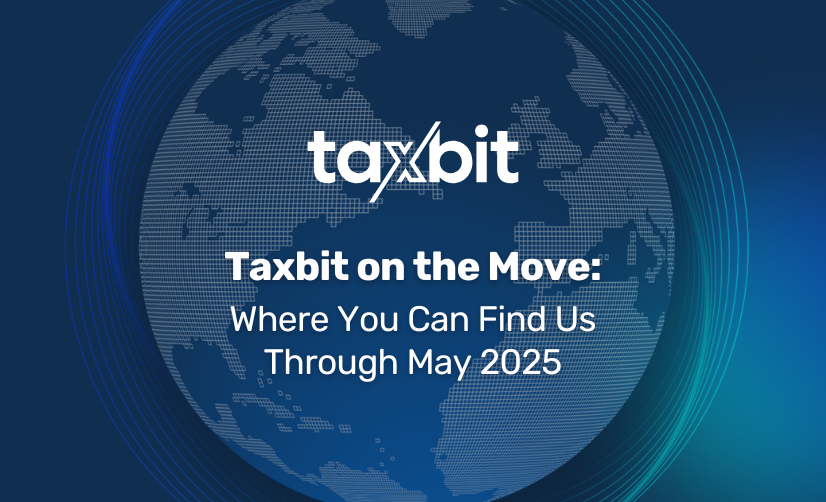How to streamline digital asset bookkeeping and meet evolving regulations with key insights from expert practitioners
This article summarizes a recent webinar hosted by Aaron Jacob, Taxbit’s Head of Accounting Solutions alongside David Thomson (Web3 Practice Lead / CFO at Attivo Partners) and Mackenzie Patel (Founding Partner at Hash Basis) – who are both members of Taxbit’s partner network – and Dipika Kumar (Solutions Engineer Taxbit).
The discussion covered a range of topics but focused on these critical concepts of how an organization can operationalize its crypto accounting.
- Current Themes and News: Amid increasing regulatory scrutiny, clarity is emerging via proposed new accounting rules from the Financial Accounting Standards Board (FASB) for crypto assets. What will these new rules mean for the digital asset industry at large – and how can companies be prepared?
- Getting Started with Crypto Accounting: Accountants have a special ability to act as critical enablers to businesses engaging with digital assets – ensuring that critical middle and back-office functions operate smoothly. What are the biggest crypto accounting challenges to understand and navigate?
- Common Challenges: What are the most common challenges that companies face with crypto accounting, and how can those challenges be minimized or eliminated?
Current Themes and News via the FASB and the SEC
There is a lot going on in the crypto space right now and particularly with regard to the regulatory landscape. While the industry laments regulatory uncertainty by the SEC, the Financial Accounting Standards Board (FASB) recently issued new proposed accounting rules for crypto assets that are critical for companies to keep track of:
- The most significant proposed change is that there will be a transition from traditional intangible asset treatments for most crypto assets to fair value accounting– which is a huge step in the right direction that better aligns accounting outcomes and economic realities.
- There will be new disclosure requirements that companies will need to abide by, along with important transition guidance.
So what are the biggest impacts that the new proposed FASB rules will have on companies going forward? Mackenzie Patel of Hash Basis explained some major tenets:
- There is going to be a cumulative opening balance adjustment that hits retained earnings. Basically, companies will need to look at your books to see what is the carrying value of cost less impairment of your digital assets as of year-end. Then, take the difference between that and the fair value of those assets on the same date – and that difference is going to be the cumulative adjustment that is booked against retained earnings. All that being said, you really need to have a clean sub-ledger to know what your historical carrying value is.
- Another major consideration is that companies will need to figure out which digital assets are going to qualify for fair value treatment overall. Some assets like BTC and ETH will qualify for fair value treatment, but then there are others like NFTs, wrapped tokens, and governance tokens which are excluded. So companies will have to do an asset-by-asset examination to see which ones fall into which bucket. For certain assets, companies will still need to do the cost less impairment model (which may be exceptionally difficult for less liquid assets like NFTs).
This is truly industry-changing guidance that’s coming out of the FASB, and it gives an opportunity for accountants to shine. Given all of the above complexity, companies should be proactive in finding technological solutions to automate and streamline this complex process. Excel simply won’t meet the crypto accounting challenge. In recent months, SEC and investor scrutiny of crypto firms has been increasing – making accurate and transparent bookkeeping more critical than ever.
What are some of the things that companies should be preparing for to ensure auditability? Dipika Kumar of Taxbit explained how:
“The best course of action is to be very transparent with regulatory auditors… Being transparent and helping explain your business and operations can save a lot of pain… With the FTX insolvency, we’ve seen an uptick in demand for accurate accounting… Investors are demanding accurate record-keeping up-front, versus having an audit down the road and then having to go back and restate financials which actually happened with a Bitcoin miner recently due to incorrect impairment calculations…”
Getting Started with Crypto Accounting
Given the mission-critical importance of accurately accounting for the complexity of crypto assets – what are the most important considerations for getting started? David Thomson of Attivo Partners shared key insights such as:
- Knowing Your Flow of Funds: Especially given SEC and auditor scrutiny, is a company commingling customer funds? Are they assisting third parties inside company wallets and accounts to convert from one currency or digital asset symbol to another? These are likely to trigger regulatory conversations – and it’s always good to check with legal counsel. Flow-of-funds and business models also translate into understanding holistic internal controls. Companies should put together a comprehensive and continuously-updated list of all company wallets, accounts, and signatories.
- Knowing Your Data Sources: The blockchains or exchanges a company uses will define the accurate information for what’s happening in its crypto accounts or wallets. For exchanges that a company has access to, the highest trading volume per asset will define the so-called “principal market pricing” for accounting for these assets. Not all exchanges are supported by enterprise crypto accounting software, however, which may require manual csv imports thereafter.
Keeping track of the above is vital for meeting regulatory requirements and understanding the broader implications of meeting GAAP or IFRS standards. Especially after last year’s market meltdowns, there are critical requirements that custodied assets should be separated from company funds so that customers are protected in the event of insolvency. Further, there are also U.S. states that require firms to have money transmitter licenses in order to custody customer funds. So it’s very important to understand the broader regulatory implications of holding customer funds.
Another critical consideration regards the number of transactions, as David explained:
“I’ll give an example where we have two different clients with 100,000 transactions per month. It’s not necessarily the number of transactions, it’s the number of different types of transactions to keep in mind. So client one may have 100,000 transactions but they’re all revenue-related. They come from the same smart contract – and using crypto accounting software it will take 10 minutes the first time to set a rule for that, so we don’t really have to think about it in the future, making the accounting load very light. Another client may pay 40 different contributors every month, but they’ve never paid those people before, so that’s going to take a lot more time because we have to chase down these new addresses…”
For tracking and setting rules and categories for different transaction types, crypto accounting software is a game-changer that can help avoid painful, error-prone manual processes.
Common Challenges in Digital Asset Accounting
There are many common challenges that companies face with crypto accounting, but there are key ways to minimize and streamline the process.
- Data Gathering and Integrity: Wallet reconciliation can be a major hurdle to accurate accounting thereafter. Companies need to have a minimum variance when it comes time for audit between the raw token amount reported for each crypto asset and the actual wallet balances in respective wallets. Wallet hygiene is crucial, and ideally, companies should maintain separate wallets for separate activities (i.e. separate wallets to collect spot trading income, accounts payable, loans, or for staking). Certain wallet providers allow you to write a note whenever payments are sent, so that way when you export the wallet history, you have a full record.
- Compliance with GAAP: Currently, public companies must account for a digital asset as an intangible asset with an indefinite life under generally accepted accounting principles (GAAP) in the United States – however, companies should be prepared for the proposed transition to fair value accounting via the FASB’s new guidance.
- Period-End Processing: It’s difficult to close current books in a timely manner while also doing historical data cleanup in parallel. Complete and accurate bookkeeping becomes vitally important but can be exceptionally challenging for crypto assets. The good news is that there are technology providers that can help streamline and automate this arduous process.
- Ensuring Auditability: Maintaining meticulous records, tracking flows of funds, maintaining wallet hygiene, avoiding commingling funds, and streamlining period-end processing are all vital aspects of ensuring auditability – and this complex process can be streamlined with industry-leading crypto accounting software.
Opportunities for Digital Asset Accounting
The challenges for crypto accounting may be daunting, but there are vital opportunities to streamline and automate the process while staying up-to-speed with evolving regulatory standards. Industry-leading solutions should enable key features for:
- Ingestion: Consuming transactions from a variety of sources for a comprehensive picture of a company’s crypto books. Crypto accounting software should support all of the blockchains and principal markets a company uses.
- Automation: Applying accounting and tax rules to data ensures accurate classification and treatment of data sources. Companies should be able to automate journal entries and apply robust rules and categorizations to carefully treat individual digital asset transactions appropriately.
- Reporting: Generating automatic and on-demand reports required by regulators, teams, and customers — ensuring financial transparency and auditability.
- Integration: Deliver accurate and verified data directly into end-user experiences, and other core systems such as Quickbooks or ERP.
Listen to the full discussion here.
The Future of Crypto Accounting
At Taxbit, we are building pioneering solutions for digital asset accounting. Our technology is trusted by some of the world’s largest regulatory agencies, accounting firms, and crypto enterprises as we enable the following:
- Scalability to handle tens of millions of transactions
- A controlled environment to support robust control frameworks
- Support for GAAP-compliant journal entry and asset tracking
- Audit support that is built with your auditors in mind
- Transparency into transaction and accounting details
- Industry thought leaders with technical accounting expertise; former FASB/AICPA/Big4 employees working with national offices as your partners








